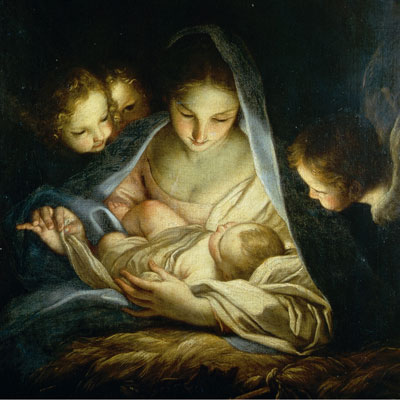Driving by the Unitarian-Universalist Church in Des Moines, the sign* read,
Any night a child is born
Is a holy night.
I smiled inwardly, a clever poke from our U-U friends. Perhaps a playful potshot intended to bring our Christian fixation with Jesus down a notch or two. More often I hear similar sentiments, not so much from Unitarians, but from secular-skeptics about the end rather than the beginning of Jesus’ life—statements like, “Innocent people are executed all the time. There are so many noble martyrs, what’s so unique about Jesus’ death?”
Maybe I’m being too hard on the U-U’s sign. There is a way to read it not as a downgrading of Jesus’ birth, but instead as an example of what theologians might call a “high Christology.” It isn’t an especially Reformed way of thinking, although I believe it was while reading Karl Barth that I first encountered it.
All human births are indeed now holy because God-in-Christ was born of a human. All mothers are holy because Jesus our Lord had a mother. Grilled fish is holy because Jesus ate such. The dust of earth is holy because it clung to Jesus’ feet. We might call it “sacralizing” all mundane things because of their contact with Jesus Christ. All creation is elevated and hallowed because Jesus lived in and among it. We Reformed folk have usually been a little too rational and unsentimental to adopt such a perspective wholly. If everything is holy, is anything finally holy?
But this sacralizing also puts Jesus in the center in a way that we Reformed ones have often struggled to do—despite our best Jesus rhetoric. “Christocentric” and “care for creation” have often seemed like ill-suited partners. We typically find our “environmental ethics” in the creation story, the psalms, Isaiah, or even Paul. But what if meadows matter more because Jesus prayed in them? Or beasts of burden bear more consideration because Jesus rode on them?
What if human beings matter more now because God became one? The imago dei of Genesis often feels like a tired trope. At an anti-capital punishment rally, the speaker—also a good friend—proclaimed, “As a Christian, I have an especially good reason for being opposed to capital punishment. The one I claim as Lord was a victim of it.” It felt like a fresh and startling statement, especially at a public rally. Rather than the more generic, “All people, even murderers, are created in the image of God…” suddenly all people were holy and valued because in Jesus Christ, God became one. And really instead of those long debates about what all is implied by Genesis’ imago dei, as Christians don’t we sort of “know better” because Jesus is “the image of the invisible God”? What would it change if Christians were to play the incarnation card more and the image-of-God card less? People aren’t only or especially valuable because we are created in the image of God, but because we are the creature in which God became incarnate in Jesus Christ.
An excerpt from Denise Levertov’s On the Mystery of the Incarnation
not to a flower, not to a dolphin
to no innocent form
but to this creature vainly sure
it and no other is god-like, God
(out of compassion for our ugly
failure to evolve) entrusts,
as guest, as brother,
The Word.
Merry Christmas to all!
* I consider myself somewhat of a church sign aficionado. I know where they are located and sometimes go out of my way in order to read them. I am, simultaneously, very grateful my congregation has no outdoor reader board. They are very hard to do well. My observation is that most outdoor church message boards are miserably moralistic. Probably, they are attempts to be relevant and practical. But if church signs were your sole source of information, you would think the church was the society of Ben Franklin or the Kiwanis. Not necessarily bad stuff, just not the Gospel. My simple and demanding advice to outdoor church signs—Say something theological. Try to include Jesus.
 If you’ve never seen it, you should take a moment to look at the church sign war between the Roman Catholic and the Cumberland Presbyterian congregations about dogs going to heaven. It made the rounds on the internet a few years ago. Fun, provocative, and a hoax. Only much later did I learn that it was a Photoshop fraud. I even heard the Cumberland Presbyterians received so many disparaging emails in response that for a while they had to put a disclaimer/explanation on their website.
If you’ve never seen it, you should take a moment to look at the church sign war between the Roman Catholic and the Cumberland Presbyterian congregations about dogs going to heaven. It made the rounds on the internet a few years ago. Fun, provocative, and a hoax. Only much later did I learn that it was a Photoshop fraud. I even heard the Cumberland Presbyterians received so many disparaging emails in response that for a while they had to put a disclaimer/explanation on their website.

